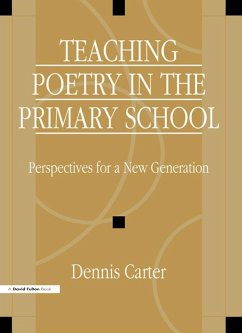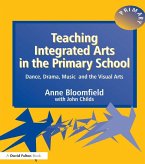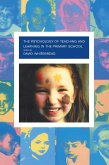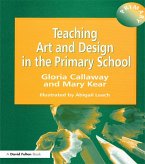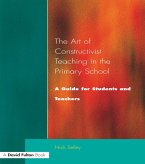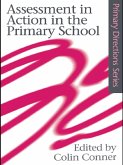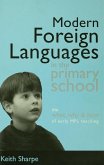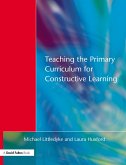37,95 €
inkl. MwSt.
Sofort per Download lieferbar

19 °P sammeln
- Format: PDF
- Merkliste
- Auf die Merkliste
- Bewerten Bewerten
- Teilen
- Produkt teilen
- Produkterinnerung
- Produkterinnerung

Bitte loggen Sie sich zunächst in Ihr Kundenkonto ein oder registrieren Sie sich bei
bücher.de, um das eBook-Abo tolino select nutzen zu können.
Hier können Sie sich einloggen
Hier können Sie sich einloggen
Sie sind bereits eingeloggt. Klicken Sie auf 2. tolino select Abo, um fortzufahren.

Bitte loggen Sie sich zunächst in Ihr Kundenkonto ein oder registrieren Sie sich bei bücher.de, um das eBook-Abo tolino select nutzen zu können.
First Published in 1999. Based on the author's experience of teaching poetry to children for more thirty years, this book offers guidance on engaging young children minds in poetry in line with the Literacy Hour.
- Geräte: PC
- mit Kopierschutz
- eBook Hilfe
- Größe: 2.24MB
Andere Kunden interessierten sich auch für
![Teaching Integrated Arts in the Primary School (eBook, PDF) Teaching Integrated Arts in the Primary School (eBook, PDF)]() Anne BloomfieldTeaching Integrated Arts in the Primary School (eBook, PDF)39,95 €
Anne BloomfieldTeaching Integrated Arts in the Primary School (eBook, PDF)39,95 €![The Psychology of Teaching and Learning in the Primary School (eBook, PDF) The Psychology of Teaching and Learning in the Primary School (eBook, PDF)]() The Psychology of Teaching and Learning in the Primary School (eBook, PDF)41,95 €
The Psychology of Teaching and Learning in the Primary School (eBook, PDF)41,95 €![Teaching Art & Design in the Primary School (eBook, PDF) Teaching Art & Design in the Primary School (eBook, PDF)]() Gloria CallawayTeaching Art & Design in the Primary School (eBook, PDF)39,95 €
Gloria CallawayTeaching Art & Design in the Primary School (eBook, PDF)39,95 €![Art of Constructivist Teaching in the Primary School (eBook, PDF) Art of Constructivist Teaching in the Primary School (eBook, PDF)]() Nick SelleyArt of Constructivist Teaching in the Primary School (eBook, PDF)38,95 €
Nick SelleyArt of Constructivist Teaching in the Primary School (eBook, PDF)38,95 €![Assessment in Action in the Primary School (eBook, PDF) Assessment in Action in the Primary School (eBook, PDF)]() Assessment in Action in the Primary School (eBook, PDF)48,95 €
Assessment in Action in the Primary School (eBook, PDF)48,95 €![Modern Foreign Languages in the Primary School (eBook, PDF) Modern Foreign Languages in the Primary School (eBook, PDF)]() Keith SharpeModern Foreign Languages in the Primary School (eBook, PDF)58,95 €
Keith SharpeModern Foreign Languages in the Primary School (eBook, PDF)58,95 €![Teaching the Primary Curriculum for Constructive Learning (eBook, PDF) Teaching the Primary Curriculum for Constructive Learning (eBook, PDF)]() Michael LittledykeTeaching the Primary Curriculum for Constructive Learning (eBook, PDF)37,95 €
Michael LittledykeTeaching the Primary Curriculum for Constructive Learning (eBook, PDF)37,95 €-
-
-
First Published in 1999. Based on the author's experience of teaching poetry to children for more thirty years, this book offers guidance on engaging young children minds in poetry in line with the Literacy Hour.
Dieser Download kann aus rechtlichen Gründen nur mit Rechnungsadresse in A, B, BG, CY, CZ, D, DK, EW, E, FIN, F, GR, HR, H, IRL, I, LT, L, LR, M, NL, PL, P, R, S, SLO, SK ausgeliefert werden.
Produktdetails
- Produktdetails
- Verlag: Taylor & Francis eBooks
- Seitenzahl: 159
- Erscheinungstermin: 26. November 2013
- Englisch
- ISBN-13: 9781134103904
- Artikelnr.: 40096261
- Verlag: Taylor & Francis eBooks
- Seitenzahl: 159
- Erscheinungstermin: 26. November 2013
- Englisch
- ISBN-13: 9781134103904
- Artikelnr.: 40096261
- Herstellerkennzeichnung Die Herstellerinformationen sind derzeit nicht verfügbar.
Peter initially was awarded a BA Degree in Psychology from University College Dublin. He felt drawn to Youth Work rather than Psychology and this led him to study for a qualification in Community Work in Maynooth University. He has over 35 years' experience of working with young people and their families in an effort to find solutions to emotional and behavioural difficulties which arise at home and at school and which may inhibit or prevent the young person in participating fully, or at all, in mainstream education. Peter initially worked as a Community Worker attached to a Special School in the North Inner City area of Dublin. Given his reservations regarding the individual model used in Education, when he began working with David Carter in Finglas, he trained as a Family Therapist, and subsequently also as a Systemic Supervisor. Peter is a registered psychotherapist with the Family Therapy Association of Ireland and the Irish Council for Psychotherapy. David Carter, B.Ed. Hons. studied at Froebel College and Trinity College Dublin before teaching in the inner city of Dublin. In 1989, he then took up a teaching post in a special school dealing with young people of the ages 10-16 years with SEBD (Severe Emotional and Behavioural Difficulties). He has 34 years of experience working in this school setting, teaching, supervising, and providing programmes for and working with at-risk youth, young people with Severe Emotional Behavioural Difficulties and with their families. Since 1998 he moved into a management position as Principal/Director of St Paul's Youth Encounter Project, Finglas, Dublin 11 and is still there at present. As associate trainer of TCI since 2001, he has worked on the implementation of TCI and adapting it to a school setting and has provided training to new and existing staff since that time. He became certified as a Professional TCI/S trainer in 2014. David has also given presentations and training on managing challenging behaviour and collaborative problem solving at several educational settings, within mainstream and special schools at both primary and secondary levels. David is also director of BEST Consultancy (Behavioural Educational Support & Training) which specialises in delivery of training and consultancy for organisations that provide care or education to children and young people who have difficulty in managing their behaviour in acceptable ways, training teachers, social workers, social care workers and by negotiation directly with families. Website: www.bestconsultancy.ie
Children and poetry: poetry and the National Curriculum
the minds of young children
poetry in the primary school
the work of Clwyd Poetry Project
poetry and the National Literacy Project
the perspectives offered in this book. Ways of working with poetry: listening
speaking
reading
memorising
creatively conversing
expressively engaging
composing
presenting, performing and publishing. Planning, assessment, recording and reporting: the making of choices
aims and schemes
assessing children's poetry-writing
the literacy hour and beyond. Literacy hour lessons: interpreting the National Literacy Project's framework
the literacy hour and the Clwyd Poetry Project model
preparing for and conducting a poetry literacy hour
a week's lessons for - reception, yr1, yr2, yr3, yr4, yr5 and yr6. Dreams and the imagination: children's thinking
reverie and imagination
developing imagination in the classroom
using poets' work
projects for Key Stages 1 and 2.
the minds of young children
poetry in the primary school
the work of Clwyd Poetry Project
poetry and the National Literacy Project
the perspectives offered in this book. Ways of working with poetry: listening
speaking
reading
memorising
creatively conversing
expressively engaging
composing
presenting, performing and publishing. Planning, assessment, recording and reporting: the making of choices
aims and schemes
assessing children's poetry-writing
the literacy hour and beyond. Literacy hour lessons: interpreting the National Literacy Project's framework
the literacy hour and the Clwyd Poetry Project model
preparing for and conducting a poetry literacy hour
a week's lessons for - reception, yr1, yr2, yr3, yr4, yr5 and yr6. Dreams and the imagination: children's thinking
reverie and imagination
developing imagination in the classroom
using poets' work
projects for Key Stages 1 and 2.
Children and poetry: poetry and the National Curriculum
the minds of young children
poetry in the primary school
the work of Clwyd Poetry Project
poetry and the National Literacy Project
the perspectives offered in this book. Ways of working with poetry: listening
speaking
reading
memorising
creatively conversing
expressively engaging
composing
presenting, performing and publishing. Planning, assessment, recording and reporting: the making of choices
aims and schemes
assessing children's poetry-writing
the literacy hour and beyond. Literacy hour lessons: interpreting the National Literacy Project's framework
the literacy hour and the Clwyd Poetry Project model
preparing for and conducting a poetry literacy hour
a week's lessons for - reception, yr1, yr2, yr3, yr4, yr5 and yr6. Dreams and the imagination: children's thinking
reverie and imagination
developing imagination in the classroom
using poets' work
projects for Key Stages 1 and 2.
the minds of young children
poetry in the primary school
the work of Clwyd Poetry Project
poetry and the National Literacy Project
the perspectives offered in this book. Ways of working with poetry: listening
speaking
reading
memorising
creatively conversing
expressively engaging
composing
presenting, performing and publishing. Planning, assessment, recording and reporting: the making of choices
aims and schemes
assessing children's poetry-writing
the literacy hour and beyond. Literacy hour lessons: interpreting the National Literacy Project's framework
the literacy hour and the Clwyd Poetry Project model
preparing for and conducting a poetry literacy hour
a week's lessons for - reception, yr1, yr2, yr3, yr4, yr5 and yr6. Dreams and the imagination: children's thinking
reverie and imagination
developing imagination in the classroom
using poets' work
projects for Key Stages 1 and 2.
